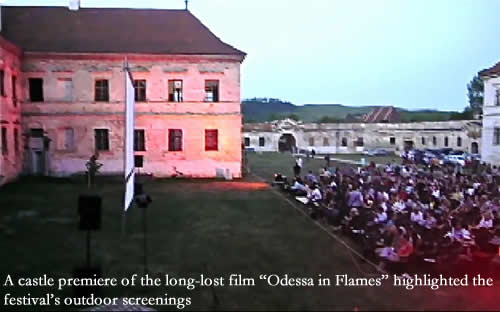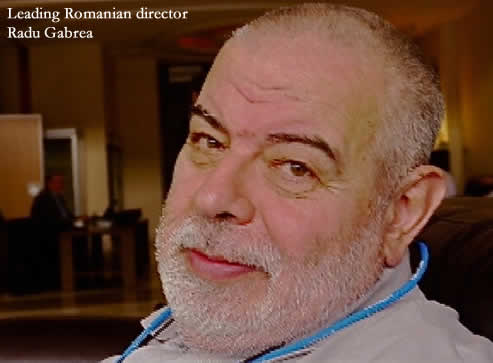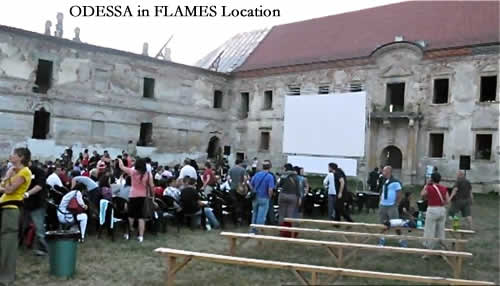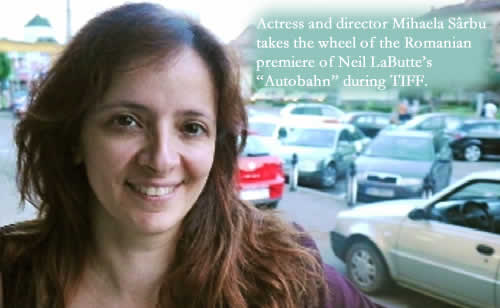 CLUJ, Romania — The Transylvania International Film Festival (TIFF) concluded its successful 10th edition — and its first as a newly accredited A-level film festival by the international film organization FIAP — by handing out two of its top prizes to the Argentinean filmmaker Miguel Cohan for his debut feature, No Return. Cohan was awarded the 15,000-euro Transylvania Prize for his detective yarn after sharing the screenwriting trophy with co-writer Ana Cohan at the festival’s closing gala June 11, before an audience of 1,000 guests at the National Theatre of Cluj.
CLUJ, Romania — The Transylvania International Film Festival (TIFF) concluded its successful 10th edition — and its first as a newly accredited A-level film festival by the international film organization FIAP — by handing out two of its top prizes to the Argentinean filmmaker Miguel Cohan for his debut feature, No Return. Cohan was awarded the 15,000-euro Transylvania Prize for his detective yarn after sharing the screenwriting trophy with co-writer Ana Cohan at the festival’s closing gala June 11, before an audience of 1,000 guests at the National Theatre of Cluj.
Cohan’s film was cited by the competition jury as “a discourse on ethics disguised as a high-quality detective story, which was shortlisted for almost every possible trophy.” The actress Jacqueline Bisset and Corina Şuteu, director of the Romanian Cultural Institute in New York, presented the top award in the presence of competition jury members Laurence Herszberg, Cedomir Kolar, Uberto Pasolini, Radu Muntean, and Vesela Kazakova.
Muntean, and Vesela Kazakova.
The directing prize went ex-aequo to Constantin Popescu for Principles of Life, and to Rúnar Rúnarsson for Volcano, two controversial movies which had disappointed a number of festival participants. Jury member and producer Uberto Pasolini presented the cinematography award to Linda Wassberg for the feature She-Monkeys, and French actress Elodie Bouchez picked up the Best Performance award for The Imperialists Are Still Alive! The Special Jury Prize went to A Federico Veiroj’s Useful Life, while the Serbian feature Tilva Roš, by Nikola Ležaić, garnered the film critics’ FIPRESCI Award “because of its honest depiction of wasted youth.” Veteran French producer and dMK2 founder Marin Karmitz, who was born in Romania, shared the Special Award with producer/cinematographer Oleg Mutu.
 In one of the gala’s more humorous moments, TIFF president Tudor Giurgiu invited three other festival notables on stage — Stefan Laudyn, director of Warsaw Film Festival; Stefan Kitanov, director of the Sofia Film Festival; and Nikolaj Nikitin, the representative from Berlin Film Festival for Central and Eastern Europe – and asked them to help him re-enact the moment when the idea of a new international film festival was conceived, in a restaurant in Varna, between two shots of tzuica. Czech film professional Stefan Uhrik, the fifth man present at the now “historical” meeting, contributed to the levity via a phone hookup.
In one of the gala’s more humorous moments, TIFF president Tudor Giurgiu invited three other festival notables on stage — Stefan Laudyn, director of Warsaw Film Festival; Stefan Kitanov, director of the Sofia Film Festival; and Nikolaj Nikitin, the representative from Berlin Film Festival for Central and Eastern Europe – and asked them to help him re-enact the moment when the idea of a new international film festival was conceived, in a restaurant in Varna, between two shots of tzuica. Czech film professional Stefan Uhrik, the fifth man present at the now “historical” meeting, contributed to the levity via a phone hookup.
Romanian actor George Motoi received the festival’s Lifetime Achievement Award, while the director of one of TIFF’s best-received films, Morgen, Marian Crişan, nabbed the Romanian Days Award For Feature Film. Best short film went to Bogdan Mirică’s Bora Bora, while director George Apetri took home the award for best debut feature for Outbound.
Veteran British actor Michael York was also given the Lifetime Achievement and thanked the organizers through a video recording, saying he was unable to attend the event in Cluj due to health reasons. 
The festival also paid homage to legendary director Lucian Pintilie with a restrospetive of his work and a TIFF Excellency Award. Directors Cristi Puiu, best known as the creator of the New Wave in Romanian cinema for his movie Stuff & Dough, and Corneliu Porumboiu both lavishly praised Pintilie as one of the country’s legendary filmmakers.
“Well, I am not sure if it’s me or Corneliu Porumboiu who’s the one getting this prize,” replied Pintilie with a wry grin, “but if it’s me, I accept it gladly.”
The ceremony closed a 10-day event highlighted by over 200 screenings and seminars, debates andmaster classes, and an outdoor screening of the long-lost classic silent film Odessa in Flames, which was only recently discovered in a storage closet at Rome’s Cinecitta Studios. The movie was given a spectacular airing at an abandoned outdoor castle a few kilometers from the city of Cluj, listed by the EU as a cultural capital of Europe.
 The packed showcase was a reminder of how much TIFF has developed since it’s creation from a mini-festival a decade ago by two friends, producer/director Giurgiu and film critic Mihai Chirilov, who wanted to show their favorite movies to a small international community of “film worms” – their term for avid filmgoing enthusiasts. This year a theatre section was also added, presenting shows that mixed video with live text-based performance.
The packed showcase was a reminder of how much TIFF has developed since it’s creation from a mini-festival a decade ago by two friends, producer/director Giurgiu and film critic Mihai Chirilov, who wanted to show their favorite movies to a small international community of “film worms” – their term for avid filmgoing enthusiasts. This year a theatre section was also added, presenting shows that mixed video with live text-based performance.
Festival events this year included the inauguration of TIFF’s sponsored venue Ursus Open Air 2011 with the screening of French director Francois Ozon’s Potiche, starring a former TIFF Lifetime Achievement award-winner Catherine Deneuve. A notable side event was a nightly theatrical performance of Neil LaButte’s typtich play Autobahn, making its Romanian debut and uniquely staged in the back seats of a fleet of cars. Audiences were divided out into the vehicles as the play began outside the nearby Hungarian National Theatre, and were then driven by the actors to various city locations whereupon their drivers performed the play in the front seats.
Meanwhile, after the closing gala, the guests left for various private dinners and invite-only parties, while the glowing “film worms” burrowed through local restaurants and clubs to meet festival guests. Beers in hands, chain-smoking and compulsively dissecting the pros and cons of their film diet over the past 10 days, they were truly the crowd for whom TIFF founders Giorgiu and Chirilov had created this increasingly popular cinema gathering.

